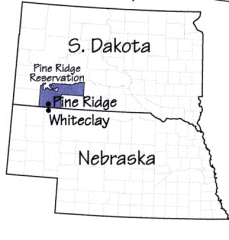About Whiteclay
 Though I will do ministry in many parts of the reservation, My ministry focus will be on the town of Whiteclay, Nebraska. Here I will attempt to give you a picture of life in Whiteclay. To understand Whiteclay, you first need to know a little about the Pine Ridge Reservation.
Though I will do ministry in many parts of the reservation, My ministry focus will be on the town of Whiteclay, Nebraska. Here I will attempt to give you a picture of life in Whiteclay. To understand Whiteclay, you first need to know a little about the Pine Ridge Reservation.The Reservation
The Pine Ridge Indian Reservation is home to the Oglala, Lakota Sioux tribe. Pine Ridge is one of the poorest reservations in the United States. The reservation has a staggering 83 percent unemployment rate. There is a major housing shortage on the reservation. The average home houses 17 people. 39.7 percent of homes have no electricity, and many are without running water.The problems on the reservation go beyond physical poverty. The Lakota on the reservation have an 80 percent alcoholism rate. Child abuse is common on the reservation, and as a result many young people grow up to become abusers themselves, or they often commit suicide. The teen suicide rate is three times the national average. The combination of poverty, alcohol and drug abuse, suicide, and violence makes the average life expectancy 48 years old for men and 52 for females. Haiti has a higher life expectancy: 59 for men and 62.5 for women.
Whiteclay
 |
| Life in Whiteclay is a slow suicide, as Lakota men and women drink until they die of sclerosis |
There are some people who spend their entire day on the streets of Whiteclay drinking. Some are homeless, but most are dropped off for the day, and are picked up before sunset. Whiteclay is populated by an average of about 50 street people in the warmer months. The street people often have traumatic pasts, and they use alcohol to temporarily forget their pain. Through Lakota Hope Ministry I will be working to share the gospel with the street people through word, but also through friendship and acts of service. When they are ready to seek recovery I will provide guidance in finding the right recover programs, and I will offer consistent encouragement and support throughout the process.



0 comments :
Post a Comment